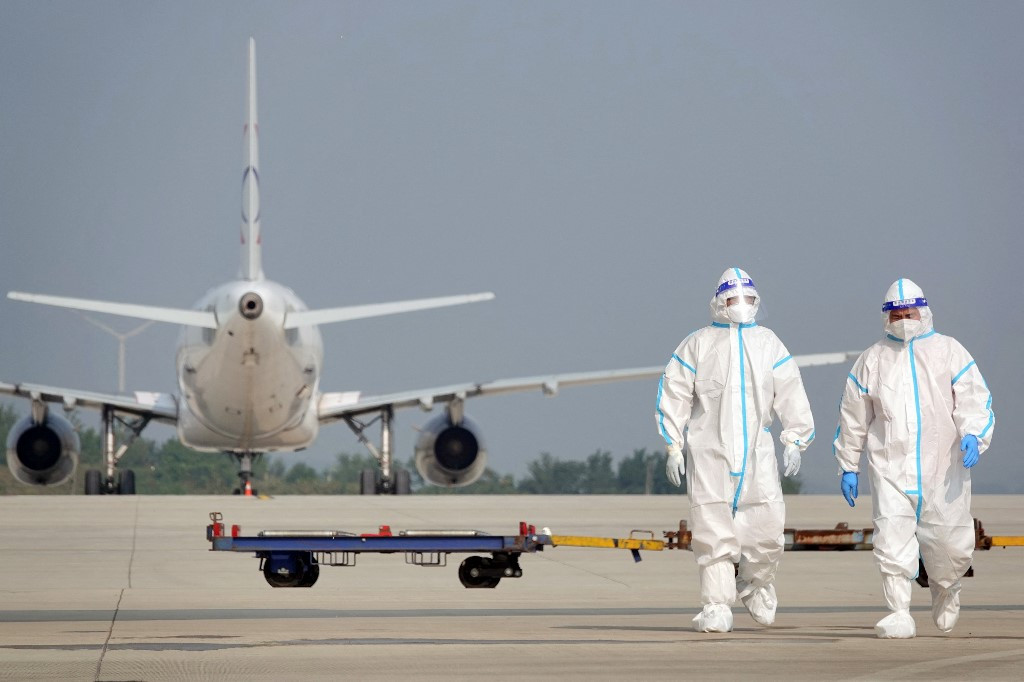Popular Reads
Top Results
Can't find what you're looking for?
View all search resultsPopular Reads
Top Results
Can't find what you're looking for?
View all search resultsChinese jubilant, plan trips abroad as inbound Covid quarantine set to end
In a snap move late Monday, China said from January 8 inbound travellers would no longer be required to quarantine upon arrival, in a further unwinding of hardline COVID-19 controls that had torpedoed its economy and sparked nationwide protests.
Change text size
Gift Premium Articles
to Anyone
 This file photo taken on September 18, 2022 shows aviation ground crew wearing personal protective equipment (PPE) working on an aircraft that flew in from abroad at the airport in Yantai in China's eastern Shandong province. China said on December 26, 2022 that it would scrap mandatory quarantine on arrival, further unwinding years of strict virus controls as the country battles a surge in cases.
(AFP/STR)
This file photo taken on September 18, 2022 shows aviation ground crew wearing personal protective equipment (PPE) working on an aircraft that flew in from abroad at the airport in Yantai in China's eastern Shandong province. China said on December 26, 2022 that it would scrap mandatory quarantine on arrival, further unwinding years of strict virus controls as the country battles a surge in cases.
(AFP/STR)
C
hinese reacted with joy and rushed to book flights overseas Tuesday after Beijing said it would scrap mandatory Covid quarantine for overseas arrivals, ending almost three years of self-imposed isolation.
In a snap move late Monday, China said from January 8 inbound travellers would no longer be required to quarantine upon arrival, in a further unwinding of hardline COVID-19 controls that had torpedoed its economy and sparked nationwide protests.
Chinese social media users reacted with joy to the end of restrictions that have kept the country largely closed off to the outside world since March 2020.
"It's over... spring is coming," said one top-voted comment on the Twitter-like Weibo social media site.
Online searches for flights abroad surged on the news, state media reported, with the travel platform Tongcheng seeing an 850 percent jump in searches and a tenfold jump in inquiries about visas.
"Preparing for my trip abroad!" one Weibo user wrote.
"I hope the price of the return ticket doesn't rise again!" another said.
The new rules follow China's decision this month to roll back much of a zero-Covid regime that had mandated mass testing, strict lockdowns and long quarantines in government-run facilities.
Cases have surged nationwide following that easing, in an outbreak that authorities have admitted is now "impossible" to track.
And in the face of mounting concerns that the country's wave of infections is not being accurately reflected in official statistics, Beijing's National Health Commission (NHC) Saturday said it would no longer publish daily tallies of the number of cases.
That followed a decision last week to narrow the criteria by which COVID-19 fatalities were counted -- a move experts said would suppress the number of deaths attributable to the virus.
The winter surge comes ahead of two major public holidays next month, in which millions of people are expected to travel to their hometowns to reunite with relatives.
Hospitals and crematoriums across the country have been overflowing with Covid patients and victims, with studies estimating around one million people could die over the next few months.
Major cities are now grappling with shortages of medicine, while emergency medical facilities are strained by an influx of undervaccinated elderly patients.
Beijing has insisted throughout the wave of infections that the country is prepared to weather the storm -- and urged people to take responsibility for their own health.
"We need the public to properly protect themselves, continue to cooperate with the implementation of relevant prevention and control measures," Liang Wannian, an epidemiologist and the head of an expert group at the NHC tasked with responding to the COVID-19 pandemic, told state news agency Xinhua.
"We need to shift the focus of our work from infection prevention and control to medical treatment."
Since January 2020, China had classified COVID-19 as a Category B infectious disease but managed it under Category A protocols that cover diseases such as bubonic plague and cholera, giving local authorities the power to quarantine patients and their close contacts and lock down regions.
While China downgrades its management of the new coronavirus, the National Health Commission said epidemic prevention and control protocols at key institutions such as elderly care institutions will be strengthened.
If an outbreak becomes severe, the institution will adopt so-called "closed management" to prevent the spread of infections, the authority said.
China will also further increase the vaccination rate among the elderly, and promote second doses among people at high risk of severe illness.
China is the last major country to move toward treating COVID as endemic. Its containment measures had slowed the $17 trillion economy to its lowest growth rate in nearly half a century, disrupting global supply chains and trade.









